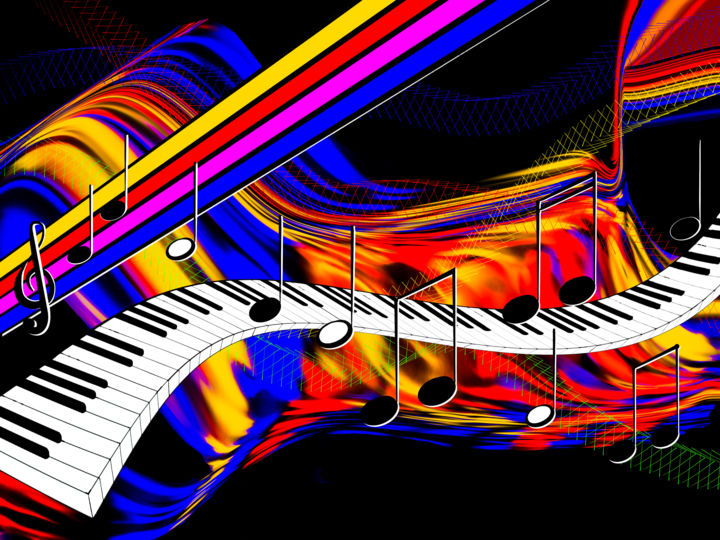
What is the connection between music and mental health?
As I covered in my last post, music affects everyone in various different ways. It can create a positive impact on illnesses, depression, and even our perception on the world (1). Since music can be both relaxing and energizing, it connects to your mental health. For example, upbeat and positive lyrics can make you feel happier, and sad lyrics and melodies can make you feel upset (2). However, any types of lyrics can also help you realize you’re not alone in whatever you’re feeling which can be comforting, and will also impact your mental health (1). Music can even help reduce insomnia, which improves your mental health in the long run (3). Listening to relaxing classical music, or lo-fi music can help make you fall asleep, along with any sort of genre you personally find calming (3). Even listening to your favourite songs when you feel stressed or panicked can help you feel better mentally (2). Overall, music affects everyone’s mental health, and I’m sure we’ve all had our own experiences where music has made us feel better, or worse. Music can truly reach a part of our brains that human connection cannot, which is why it can always affect our mental health (4).
How does music help survivors of traumatic experiences?
Now that we understand how music can help everyone in their daily lives, I looked at how music helps trauma survivors specifically. One of the best ways music can help survivors is by listening to music made by someone who has experienced the same thing as them, and feeling heard and understood (5). “Truly great music has the ability to invite listeners into a story that feels familiar to them,” and this is so important because trauma survivors need to know that they aren’t alone (5). Another notable thing I learned is that music can help trauma survivors come out of freeze mode (6). I’m sure we’ve all heard of the “fight or flight” reaction, but trauma survivors frequently experience something called freeze mode. Freeze mode is something that happens when trauma survivors feel triggered, unsafe, or threatened (7). Sometimes they can be pulled back into unwanted memories from their past, and this causes them to freeze (7). Things survivors experience during freeze mode can be not being able to move, a drop in their heart rate, and muscle tension (7). However, music is something that can actually pull people out of this state! In our ears, we have something called cilia, which are little cellular hairs. Cilia stops moving when our nervous system is in a panicked state, and this is why when people are in freeze mode they may have trouble hearing, or understanding others. However, listening to music and music stimulation can actually mobilize these hairs again, and bring people out of freeze mode which is amazing (6)! This is another way that music reaches parts of our brain other things can’t, and an incredible way that music connects with trauma. While we all have different coping mechanisms and different things that work for us, music is something that helps most trauma survivors greatly.
Can music replace in person therapy?
There are many key differences between music therapy and in person therapy. Music therapy uses thing like lyric analysis, improvisation music playing, active music playing, and song writing (2). These are all things that help trauma survivors because in person therapy can feel threatening, and overwhelming, but things like lyric analysis and listening to music can help you process your emotions in a healthy way still (8). However, with all that being said, I don’t think it could ever replace in person therapy. Therapists can help you understand things you would never understand on your own, and can help with coping strategies and lots more (9). While music can do so many amazing things, I don’t think it could ever replace human connection, because that is still something we need (9). Overall, I think just doing what is best for you is the best thing to do. Music therapy may work for some people, but traditional therapy may work better for others. It’s all about preferences.

Next post: For my next round of research, I will be learning about the different ways music has helped people. For this step, I will ask some of my friends and family members about ways music has helped them, and what music means to them. Personally, I can’t imagine a world without music, and I think it would be interesting to see what other people’s point of views are. This will help me have an even deeper understanding of music and mental health, and it will give me a different insight instead of only hearing opinions online. After completing my next post, I think I will have a good understanding about the relationship between music and trauma!
Thank you for reading (:
Sources:
(1) https://www.cnn.com/2019/02/08/health/music-brain-behavior-intl#:~:text=Research%20suggests%20music%20can%20influence,aggressive%20thoughts%2C%20or%20encourage%20crime.
(2) https://www.nami.org/Blogs/NAMI-Blog/December-2016/The-Impact-of-Music-Therapy-on-Mental-Health#:~:text=Research%20shows%20the%20benefits%20of,for%20anxiety%20or%20for%20dysregulation.
(3) https://www.verywellmind.com/surprising-psychological-benefits-of-music-4126866
(4) https://www.essexmusichub.org.uk/site/music-reaches-parts-of-the-brain-that-other-things-cant/#&gid=1&pid=1
(5) https://blog.reverbnation.com/2018/06/19/4-ways-music-helps-listeners-cope-life-feel-understood/
(6) https://www.instagram.com/thesurvivorsadvocate/
(7) https://www.medicalnewstoday.com/articles/fight-flight-or-freeze-response
(8) https://www.apa.org/monitor/2013/11/music
(9) https://www.healthline.com/health/benefits-of-therapy#takeaway


Hey Shaila,
I love your approach to this heavy topic and how you were able to break each segment into more questions to help us readers understand more!
Some question’s I had for your post was, is there a certain trauma disorder which responds best to music therapy? As you mention the “freeze” symptom that many trauma survivors experience, here are some resources that may help you with this topic!
https://soar.suny.edu/bitstream/handle/20.500.12648/683/Greco_Thesis.pdf?sequence=3&isAllowed=y
https://www.edimprovement.org/post/music-therapy-traumatized-children
https://blog.flat.io/the-role-of-music-in-the-trauma-healing-process/
And here is a ted talk i found that may help:
https://www.youtube.com/watch?v=IWQnTUunhuY
Cant wait for your next post!
– Sanam M